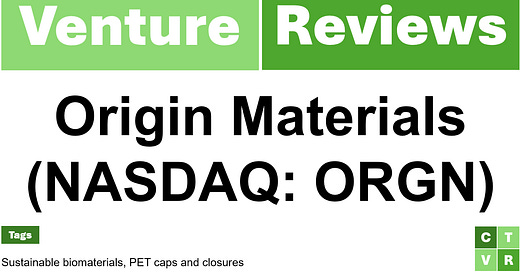Origin Materials (NASDAQ: ORGN)
This company has discovered a revolutionary low-carbon production method for polyesters and other chemicals essential for everyday life. Its short-term focus is on innovative bottle caps.
Executive Summary
Origin Materials (NASDAQ: ORGN) competes in two different businesses: sustainable biomaterials and plastic caps and closures.
The sustainable biomaterials business requires high capital expenditures and produces industrial commodity chemicals in a $1 trillion-plus market dominated by large, politically powerful petrochemical incumbents.
Origin’s caps and closures business focuses on producing bottle caps for single-use plastic drink bottles, a fragmented market worth an estimated $65 billion per year. Origin’s products’ main selling points are their light weight and ease of recyclability.
Origin was founded by John Bissell, the company’s current CEO, and Ryan Smith, the company’s current chief product officer, as a senior class project at the University of California Davis.
The company went public in a deSPAC transaction in 2021 that raised around $500 million, of which around $100 million is still on the balance sheet. The stock price fell heavily after the company announced difficulties in funding and building a commercial biomaterials plant, at which time the company pivoted to the caps and closures business in a bid to generate cash and boost its stock price.
The company has rethought the design of plastic drink bottle caps and has pioneered a production process for the manufacture of caps and closures from PET, the same material from which drink bottles are made.
The company has discovered a pathway to manufacture commodity chemicals using woodchips and other lignocellulosic biomass such as sawdust and scrap wood. The company’s technology has been successful in producing a wide range of plastics and other essential chemicals from 100% organic feedstocks.
The company is guiding to over $100 million in revenues in 2026, reaching an EBITDA profitable run rate by the end of that year. These revenues and profits will be generated solely through the caps and closures business.
The biomaterials business is presently in R&D mode until the company has the financial wherewithal and a willing financial partner to build a commercial-scale production facility. The company maintains that demand for its biomaterials solution remains strong.
The positive climate impact of the caps and closures business revolves around improvements in recycling efficiency and the diminished need for virgin hydrocarbon feedstocks when caps and bottles are manufactured from the same material.
The positive climate impact of the sustainable biomaterials business is profound. It would enable the production of plastics and other essential materials without mining hydrocarbons.
Keep reading with a 7-day free trial
Subscribe to Climate Tech Venture Review to keep reading this post and get 7 days of free access to the full post archives.





